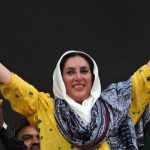Bhutto’s first cabinet was the largest in Pakistan’s history. She appointed herself as the new treasury minister, with her mother as a senior minister without portfolio, and her father-in-law as chairman of the parliamentary public accounts committee, quashing hopes that her administration would depart from the entrenched systems in the country Most of those in the administration had little political experience Various members of the PPP old guard, including left the party in frustration at the pro-capitalist direction she had taken.
Following her election, there remained significant mistrust between Bhutto and the right-wing military administration; many senior military figures viewed her, like her father, as a threat to their dominant role in Pakistan’s political arena. The country’s three most powerful figures—the army chief the ISI chief Hamid Gul, and President Khan—all had contempt for her family. This opposition was substantial and contributed to Bhutto’s inability to pass any major legislation during her first term in office. However, she had some successes with initiatives to encourage the development of civil society; she ensured the release of several political prisoners detained under the Zia government. and lifted the ban on trade unions and student associationsShe removed many of the constraints imposed on non-governmental organizations, and introduced measures to lift the media censorship introduced by Zia’s military administrations. She entrusted Shamsul Hasan with dismantling the National Press Trust, a conglomerate of over 15 newspapers, but President Khan delayed signing the documents and thus the Trust would only be broken up during her second premiership Several social reforms were carried out, such as the establishment of new literacy centers, new pension rights, and the abolition of admission and bed fees forced upon during the Zia regime.


